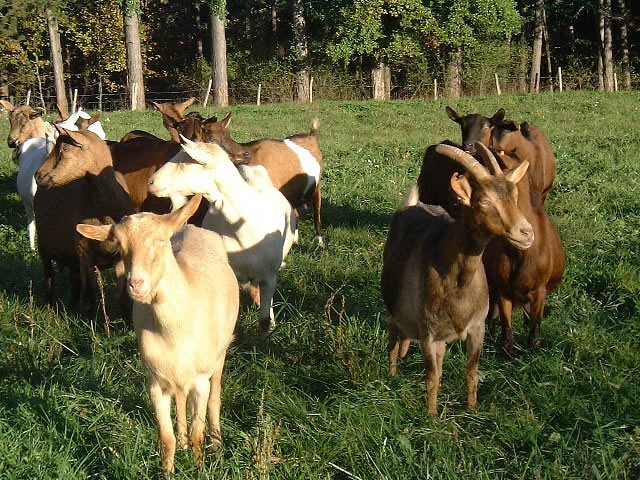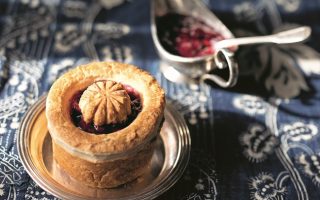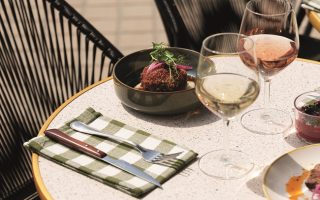Artisanal Goat Cheese in the Dordogne

The Dordogne region in southwest France is an ancient land of green river valleys, orange stunted oak forests (where wild boars snuffle for truffles), pale limestone hamlets and unpalatable purple wine. Until around 50 years ago, almost all of the area’s inhabitants made their living as part of self-sufficient farming communities. Transactions at the weekly markets were carried out entirely through bartering, and the baker operated a notches-in-pegs system to keep a record of how many loaves customers had taken from their sacks of flour, so hard currency wasn’t really a part of daily life.
The region’s houses had beaten earth floors (some still do) and all cooking was accomplished over an open fire. But the locals felt rich, as they had as much food as they could want, including foie gras and truffles, and a varied diet that changed with the seasons. Now modern farming methods have crept in, including the planting of single-crop fields that stamp on diversity. Food prices are so low that a quarter of farms are lost every decade, along with the attendant skills and communities.
Still, a few determined souls are standing strong and demonstrating that small-scale ‘human-sized’ agriculture is best for everyone, including the consumer. For instance, Christelle and Dominique Foucaut, who live a mile down the road from me, have spent the past 25 years making goat’s cheese for a living. Their traditional cabécou cheeses – small, flat, soft, delicate, fresh, sometimes gooey and one of the region’s favourite specialities – are in huge demand at local markets. Dominique helped set up the Dordogne Maison des Paysans, which roughly translates as the Association of Rural Traditional Artisan Producers.
The Foucauts produce one of only around 35 artisan cheeses in the Dordogne. That is, there are only 35 people left who milk their own animals and make their own cheese. All of the region’s other dairy farmers sell their milk to massive co-ops – essentially, cheese factories.
Hilltop Eyrie
I went to see the Foucauts at their tiny hilltop farm, which is situated in a glade of meadows surrounded by woodland. The couple explained that they were from northern France, but wanted a different lifestyle, loved the region, and knew they wanted to make a living from farming. When the couple found the still-functioning goat farm, they decided to give it a go instead of growing vegetables, as planned. Dominique stayed with the previous owners for a few months, learning the skills he needed to run the farm; “This was crucial, as a foreigner to the area, culture and industry.”
The Foucauts love their goats too much to sell as meat, although they do sell the surplus kids, and make all of their income from selling cheese at markets. Instead of putting the “older ladies” up for slaughter, they keep them longer than normal – “they should really go after five years,
but we keep them in production for more like 10 years!” says Christelle – and then they’re given away for grazing. They know each of their 40 goats by name and the limited number means that they’re less time consuming to care for. Tasks like trimming hooves are less arduous and the lack of crowding means fewer diseases and parasites.
Dominique adds that, “Some people are surprised that we can make a living from 40 goats, but, although the type of cheese we make is very time consuming, the yield per litre of milk is high.” Amazingly, there’s no cheese wastage at all, because it’s sold at all levels of maturation and never goes off. Their main products are the fresh cabécou cheeses, but customers also travel a long way to buy the extra strong, dry, matured versions, which are increasingly difficult to find, and fresh coated curds.
Roaming Free
Asked whether the farm’s turnover suffers because their goats roam free in the fields and woods, rather than being kept indoors with regulated feed, the Foucauts reason it’s more important that the resultant milk is rich and of good quality, rather than of great quantity, in order to make the best cheese. “Our goats have a really good diet of wild plants and grass, with hay and a little grain in the winter,” Dominique explains. “They’re never fed silage or pellets like in more intensive farming.”
If they used non-natural feed, the Foucauts could increase their cheese production but would lose customers, because of the resultant change in taste and texture. At present, the flavour of their cheese changes with the seasons as the goats eat a range of herbs, leaves and fruit at different times of year – for example, lots of blackberries in September. Each farm and smallholding used to have its own distinct cheese, due to specific moulds, yeasts and bacteria, as well as the plants growing on their land.
Tough Love
This all sounds utterly idyllic, but life isn’t always easy for the couple and their children. They have to milk the goats twice each day, so weekends don’t exist. Holidays are impossible except occasionally when the goats are pregnant and, therefore, don’t provide any milk.
“We do three jobs, really,” says Dominique. “Firstly, we care for the animals. Secondly, there’s the cheese-making, which takes a couple of hours every day. Then there are the markets, where we have contact with the public and meet loyal customers – this makes everything worthwhile.”
The Foucauts still enjoy eating their cheese, says Christelle; “Dominique deals with their maturation, so he’s obliged to taste them very regularly. The children all like our cheese, and the dishes made with it.”
At the Friday market, Christelle often slips in an extra cabécou for her regular customers, carefully wrapping them in waxed paper. It’s a precious handmade gift and it always makes my week.
Originally published in the August-September 2013 issue of France Today
Want to visit The Dordogne? Join France Today on one of our luxury tours of Delightful Dordogne
Share to: Facebook Twitter LinkedIn Email
Leave a reply
Your email address will not be published. Required fields are marked *




REPLY